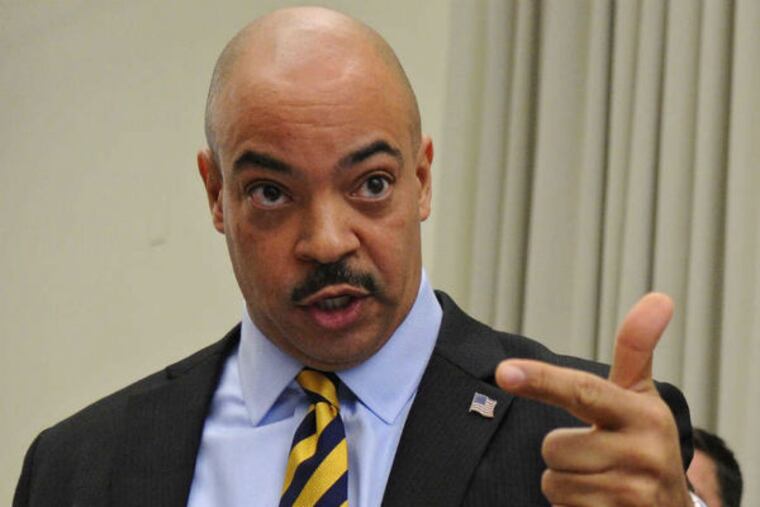Phila. D.A. seeks to overturn Wolf's death-penalty moratorium
Suggesting that Gov. Wolf is acting like a despot rejecting the rule of law based on his personal disapproval, District Attorney Seth Williams on Wednesday petitioned the Pennsylvania Supreme Court to overturn the governor's moratorium on the death penalty.

Suggesting that Gov. Wolf is acting like a despot rejecting the rule of law based on his personal disapproval, District Attorney Seth Williams on Wednesday petitioned the Pennsylvania Supreme Court to overturn the governor's moratorium on the death penalty.
"Our constitution does not allow the governor to satisfy his own personal opinions by halting a capital murderer's sentence that was authorized by state statute, imposed by a unanimous Philadelphia jury, and upheld by state and federal courts," Williams said in announcing his petition.
The 25-page petition cites as a matter of urgency for the high court the scheduled March 4 execution date for Terrance Williams, a Philadelphia man sentenced to die for the 1984 murder of Amos Norwood, who was beaten to death with a tire iron.
Wolf announced his moratorium Friday, calling the death penalty in Pennsylvania a "flawed system that has been proven to be an endless cycle of court proceedings as well as ineffective, unjust, and expensive."
He said the moratorium would remain in place until a task force established by the state Senate to study capital punishment "has produced its recommendations and all concerns are addressed satisfactorily."
The state Senate created the task force in 2011, and it had a deadline of December 2013 to issue a report, but the deadline was extended.
Wolf has described his action legally as a "reprieve" for every scheduled execution, thus imposing an effective moratorium.
The state constitution says that the governor has the power to grant reprieves, but it also states that the governor cannot unilaterally grant commutations or pardons.
Williams' petition argues that the reprieve power is for last-minute reviews of evidence or legal claims, not for a sweeping moratorium on a law passed by the legislature and upheld by the courts.
"This lawless act by the governor, improperly and inaccurately characterized as a reprieve - for the act issued in this case is not, in fact, a reprieve - is not within the constitutional powers of the governor, usurps judicial review of criminal judgments, and is a direct violation of his duty to faithfully execute Pennsylvania law," the petition states.
The state constitution says that commutation or pardoning of any death sentence requires the unanimous recommendation in writing of the Board of Pardons.
Wolf said that his action did not constitute commutation of any sentences and that he was not expressing sympathy for the guilty on death row.
The petition argues that to allow the moratorium to stand would grant the governor "unconstitutional power to ignore any selected laws at his sole option," based on nothing but the governor's personal disapproval.
"Such a power belongs only to despotism," the petition says.
There are 186 inmates on death row in Pennsylvania. The last person executed was Philadelphia torture-killer Gary M. Heidnik in 1999.